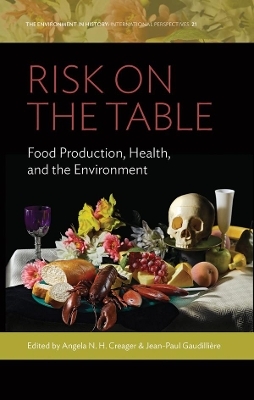
Risk on the Table
Berghahn Books (Verlag)
978-1-78920-944-0 (ISBN)
Over the last century, the industrialization of agriculture and processing technologies have made food abundant and relatively inexpensive for much of the world’s population. Simultaneously, pesticides, nitrates, and other technological innovations intended to improve the food supply’s productivity and safety have generated new, often poorly understood risks for consumers and the environment. From the proliferation of synthetic additives to the threat posed by antibiotic-resistant bacteria, the chapters in Risk on the Table zero in on key historical cases in North America and Europe that illuminate the history of food safety, highlighting the powerful tensions that exists among scientific understandings of risk, policymakers’ decisions, and cultural notions of “pure” food.
Angela N. H. Creager is the Thomas M. Siebel Professor in the History of Science at Princeton University, where she directed the Shelby Cullom Davis Center for Historical Studies from 2016–20. Her current work focuses on the role of genetic tests in environmental science and regulation during the late twentieth century.
List of Figures and Tables
Acknowledgements
List of Abbreviations
Introduction
Angela N. H. Creager & Jean-Paul Gaudillière
Part I: Objectifying Dangers
Chapter 1. Salad Days: The Science and Medicine of Bad Greens, 1870–2000
Anne Hardy
Chapter 2. Radioactive Diet: Food, Metabolism, and the Environment, c. 1960
Soraya de Chadarevian
Chapter 3. Poison and Cancer: The Politics of Food Carcinogens in 1950s West Germany
Heiko Stoff
Chapter 4. “EAT. DIE.” The Domestication of Carcinogens in the 1980s
Angela N. H. Creager
Chapter 5. Risk on the Negotiating Table: Malnutrition, Mold Toxicity, and Postcolonial Development
Lucas M. Mueller
Chapter 6. Contaminated Foods, Global Environmental Health, and the Political Recalcitrance of a Pollution Problem: The Case of PCBs from 1966 to the Present Day
Aurélien Féron
Part II: Ordering Risks
Chapter 7. Trace Amounts at Industrial Scale: Arsenicals and Medicated Feed in the Production of the “Western Diet”
Hannah Landecker
Chapter 8. Between Bacteriology and Toxicology: Agricultural Antibiotics and US Risk Regulation (1948–77)
Claas Kirchhelle
Chapter 9. Conflicts of Interest, Ignorance, and Hegemony in the Diethylstilboestral US Food Crisis
Jean-Paul Gaudillière
Chapter 10. Defining Food Additives: Origins and Shortfalls of the US Regulatory Framework
Maricel V. Maffini and Sarah Vogel
Chapter 11. The Rise (and Fall) of the Food-Drug Line: Classification, Gatekeepers, and Spatial Mediation in Regulating US Food and Health Markets
Xaq Frohlich
Afterword
Deborah Fitzgerald
Index
| Erscheinungsdatum | 15.01.2021 |
|---|---|
| Reihe/Serie | Environment in History: International Perspectives |
| Verlagsort | Oxford |
| Sprache | englisch |
| Maße | 152 x 229 mm |
| Themenwelt | Geschichte ► Teilgebiete der Geschichte ► Kulturgeschichte |
| Naturwissenschaften | |
| Technik ► Lebensmitteltechnologie | |
| ISBN-10 | 1-78920-944-7 / 1789209447 |
| ISBN-13 | 978-1-78920-944-0 / 9781789209440 |
| Zustand | Neuware |
| Informationen gemäß Produktsicherheitsverordnung (GPSR) | |
| Haben Sie eine Frage zum Produkt? |
aus dem Bereich


